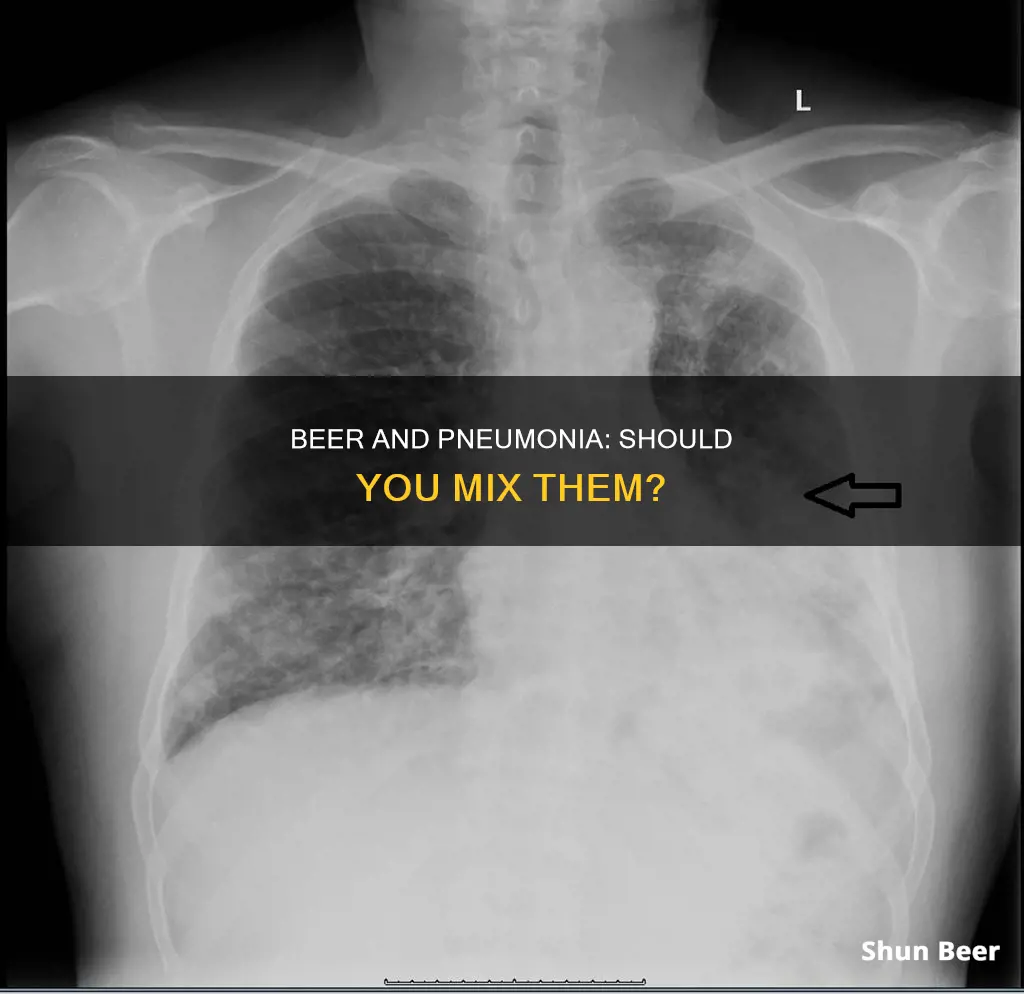
Pneumonia is a serious lung condition that can be caused or worsened by alcohol consumption. Alcohol abuse has been linked to a two- to nine-fold increase in the risk of pneumonia, and alcohol consumption is already high in Western populations. Not only does alcohol increase the risk of developing pneumonia, but it also increases the risk of hospitalisation and death from the disease. Therefore, it is generally recommended to limit or avoid drinking alcohol when recovering from pneumonia.
| Characteristics | Values |
|---|---|
| Alcohol consumption and pneumonia risk | The link between alcohol consumption and pneumonia risk is not well understood. However, alcohol abuse has been associated with a higher risk of pneumonia. |
| Alcohol abuse and pneumonia | Alcohol abuse can lead to pneumonia and worsen the condition. It impairs immune responses, causing susceptibility to pulmonary infections. |
| Alcohol and pneumonia recovery | It is recommended to limit or avoid drinking alcohol during pneumonia recovery. Alcohol can cause or worsen dehydration and increase the risk of pneumonia. |
| Alcohol intake guidelines | For men aged 21-64, low-risk drinking is defined as no more than 4 drinks per day or 14 drinks per week. For women and men over 65, it is no more than 3 drinks per occasion or 7 drinks per week. |
What You'll Learn

Alcohol abuse and pneumonia risk factors
Alcohol abuse is a well-documented risk factor for pneumonia, with research confirming the association for over 200 years. Excessive alcohol consumption negatively affects the immune system, increasing the risk of infections such as pneumonia. Heavy drinkers are at a heightened risk of contracting various forms of pneumonia and suffering from acute lung injury and acute respiratory distress syndrome (ARDS).
Alcohol abuse impairs the body's ability to defend against infection and can lead to a decreased ability to clear mucus from the lungs. It also disrupts immune pathways, further compromising the body's defences. Additionally, alcohol intoxication facilitates the aspiration of oropharyngeal secretions, allowing bacteria to enter the lower airways and cause pneumonia.
The risk of pneumonia is also influenced by other factors such as age, with children under five and adults over 65 being more susceptible. Individuals with certain chronic conditions, such as diabetes, heart or lung disease, and those with weakened immune systems are also at higher risk.
To reduce the risk of pneumonia, it is advisable to limit alcohol consumption, get a yearly flu shot, wash hands regularly, and avoid tobacco.
Drinking Beer in NYC: Open Secrets and Legalities
You may want to see also

The impact of alcohol on the immune system
Drinking alcohol, even in small amounts, can affect the immune system. Alcohol has been linked to adverse immune-related health effects, such as an increased susceptibility to pneumonia, acute respiratory stress syndrome (ARDS), sepsis, alcoholic liver disease (ALD), and certain cancers. Research has also shown that alcohol consumption can lead to a higher incidence of postoperative complications and slower recovery from infections and physical trauma, including poor wound healing.
The immune system is made up of two parts: the innate immune system, which provides general immunity by responding to viruses, bacteria, and other microorganisms that can cause disease; and the adaptive immune system, which is responsible for immune memory, such as recognising a previous infection and preventing it from happening again. Alcohol negatively impacts both parts of the immune system.
Short-term effects of alcohol on the immune system include suppressing the immune system for up to 24 hours after consuming 5-6 drinks in a single session. Long-term effects of alcohol on the immune system include longer-term problems due to the immune system taking longer to recognise and respond to infections, resulting in more intense illnesses, longer-lasting symptoms, and the immune system having to work harder to fight off infections.
Alcohol impacts the lungs by damaging the immune cells that protect them and reducing the ability of the cells within the airways to remove mucus, which can lead to a weakening of lung function over time. This damage often goes unnoticed until a severe infection occurs. Heavy drinking can result in a 3-7 times higher vulnerability to serious conditions, such as pneumonia, developing from common respiratory tract infections.
Alcohol also impacts the gut by disrupting the balance of 'good' bacteria in the gastrointestinal (GI) tract, which is essential for healthy immune function. Additionally, alcohol impacts the cells that make up the lining of the GI tract, which regulate what is absorbed into the body, and this is one of the factors linked to the development of alcoholic liver disease.
Can Diabetics Drink Michelob Ultra Beer? Know the Facts
You may want to see also

Acute respiratory distress syndrome
Drinking large amounts of alcohol can lead to pneumonia, and it can also cause or worsen dehydration. Therefore, it is recommended that women limit alcohol to one drink a day and men to two drinks a day.
If you are suffering from pneumonia, it is best to limit or avoid drinking alcohol completely. This is because alcohol can cause dehydration, which can make it harder for your body to fight off the infection and recover.
Pneumonia is a lung infection that can be caused by bacteria or viruses. The condition causes inflammation in the lungs, making it difficult to breathe. In severe cases, pneumonia can lead to a life-threatening condition called acute respiratory distress syndrome (ARDS).
ARDS is a serious lung condition that causes low blood oxygen. It is often a result of another disease or a major injury. In ARDS, fluid builds up inside the tiny air sacs of the lungs, and a foamy substance called surfactant breaks down. The fluid buildup and lack of surfactant prevent the lungs from properly filling with air and moving enough oxygen into the bloodstream and throughout the body.
The first symptom of ARDS is usually shortness of breath. Other symptoms include low blood oxygen, rapid breathing, and clicking, bubbling, or rattling sounds in the lungs when breathing. ARDS can develop at any age and can become life-threatening very quickly. Therefore, it is important to seek medical attention if you are experiencing any of these symptoms.
Pumping and Drinking: Is It Safe to Mix?
You may want to see also

Preventing pneumonia
Pneumonia is a serious and potentially life-threatening lung infection caused by bacteria, viruses, fungi, or irritants. While it can be treated with antibiotics, it is always better to prevent it from occurring in the first place. Here are some ways to reduce your risk of getting pneumonia:
Vaccines
Vaccines can help prevent some types of pneumonia. It is recommended to get the yearly flu vaccine, as people can develop bacterial pneumonia after a case of the flu. Additionally, the pneumococcal vaccine is available to prevent pneumonia caused by pneumococcal bacteria. This vaccine is especially important for people over 65, children under 2, and those with weak immune systems.
Hygiene
Good hygiene practices are essential to preventing pneumonia. Wash your hands frequently with soap and water, especially after coughing, blowing your nose, using the bathroom, and before eating or preparing food. Use hand sanitiser when you don't have access to soap and water. Avoid touching your eyes, nose, or mouth without clean hands, and cover your mouth when you cough or sneeze.
Smoking
Smoking damages your lungs and increases your risk of developing pneumonia. It prevents your lungs from properly filtering out and defending your body against germs. If you smoke, consider quitting as soon as possible.
Immune System
Keep your immune system strong by getting regular physical activity, eating a healthy and balanced diet with plenty of fruits and vegetables, and getting enough rest. Managing existing health conditions, such as asthma, COPD, diabetes, and heart disease, is also important.
Alcohol Consumption
Excessive alcohol consumption can lead to pneumonia and worsen dehydration. It is recommended that women limit alcohol to one drink per day, and men to two drinks per day.
Kids and Beer: What's the Deal?
You may want to see also

Treatment options for pneumonia
Pneumonia is a lung infection that can range from mild to severe. Treatment options depend on the type of pneumonia, the severity of symptoms, age, and any other health conditions. The goals of pneumonia treatment are to cure the infection and prevent complications. Here are some treatment options for pneumonia:
Medication
If pneumonia is caused by bacteria, doctors will typically prescribe antibiotics. It is important to take the full course of antibiotics, even if symptoms improve, to prevent the infection from returning and reduce the risk of antibiotic resistance. Antibiotics are not effective against viral pneumonia, but in some cases, doctors may prescribe antiviral medications. For fungal pneumonia, antifungal medication is the recommended treatment option.
Hospital Treatment
In severe cases of pneumonia, hospitalisation may be required. Treatment in a hospital setting can include intravenous fluids, antibiotics, oxygen therapy, and other breathing treatments. In some instances, doctors may need to drain fluid from the lungs.
Home Care
Most people can manage their symptoms at home. This includes controlling fever with medications such as aspirin, non-steroidal anti-inflammatory drugs (NSAIDs), or acetaminophen. Drinking plenty of fluids helps loosen secretions and brings up phlegm. Warm beverages, steamy baths, and using a humidifier can help open airways and ease breathing. It is important to avoid smoke and get plenty of rest during recovery.
Prevention
Pneumonia can be prevented by getting vaccinated, particularly for those at higher risk, such as young children and older adults. Maintaining good hygiene practices, such as frequent handwashing, can also help prevent the spread of germs that cause pneumonia.
Dialysis and Alcohol: Is Beer Safe for Dialysis Patients?
You may want to see also
Frequently asked questions
No, it is not recommended to consume beer or any other alcoholic beverage when you have pneumonia. Alcohol abuse is a risk factor for pneumonia, and people who abuse alcohol are more likely to develop and even die from pneumonia.
Alcohol suppresses the immune system, causing impaired immune responses and making it easier for germs to invade your lungs.
According to the National Institute on Alcohol Abuse and Alcoholism, low-risk drinking is defined as no more than 4 drinks per day or 14 drinks per week for men aged 21-64, and no more than 3 drinks per occasion or 7 drinks per week for women and men aged 65 and older.
In addition to limiting alcohol consumption, you can lower your risk of pneumonia by getting vaccinated, washing your hands frequently, covering your mouth when you cough, and avoiding close contact with people who are sick.







